
Catalytic Converter Theft: Why 1 in 5.8 BMW Cars Are Being Targeted
Catalytic converter theft has become an epidemic in the UK, especially in London. In 2021, car thieves sighted out specific models like the Honda Jazz and Toyota Prius. Although you might think that more than half of the 5,000 reports from 2021 were made for minor thefts stolen, the truth is incredibly different. Thieves are motivated by the precious metals inside each converter – palladium, rhodium, and platinum – which can fetch hundreds or even thousands of pounds on the black market. Let’s see how Brits can protect their cars and what brands are rather ignored by fraudsters.
- The most targeted cars in London
- An Investigative Report on Catalytic Converter Crime
- Enter at Your Own Risk: London’s Catalytic Converter Theft Hotspots
- Catalytic converter theft across time
- Short history of this type of burglary
- How UK citizens see these odd crimes
- Payouts on Wheels: Models With the Most Valuable Catalytic Converters
- The unlucky 13: Top cars for catalytic converter theft
- What is a catalytic converter?
- How to prevent catalytic converter theft
- Methodology
The most targeted cars in London
| Car manufacturer | Odds of losing your CAT converter | Catalytic converter theft count (2021) |
|---|---|---|
| Honda | 1 in 3.69 | 2887 |
| Toyota | 1 in 4.24 | 2512 |
| BMW | 1 in 5.86 | 1817 |
| Lexus | 1 in 7.21 | 1478 |
| Volkswagen | 1 in 20.92 | 509 |
| Mazda | 1 in 51.95 | 205 |
| Mercedes-Benz | 1 in 64.94 | 164 |
| Ford | 1 in 94.25 | 113 |
| Vauxhall | 1 in 99.53 | 107 |
| Volvo | 1 in 119.66 | 89 |
Share of the first ten out of all cases

Source of catalytic converter theft UK stats
All presented odds have been computed based on data published by the Metropolitan Police Service.
The figures cover specifically catalyser theft reports from inner and outer London within 2021. While the report counts are net values and exact, odds consider the share of total cases that the reports concerning the specific car models.
Catalytic Converter Theft: Models Car Thieves Are Skipping Over
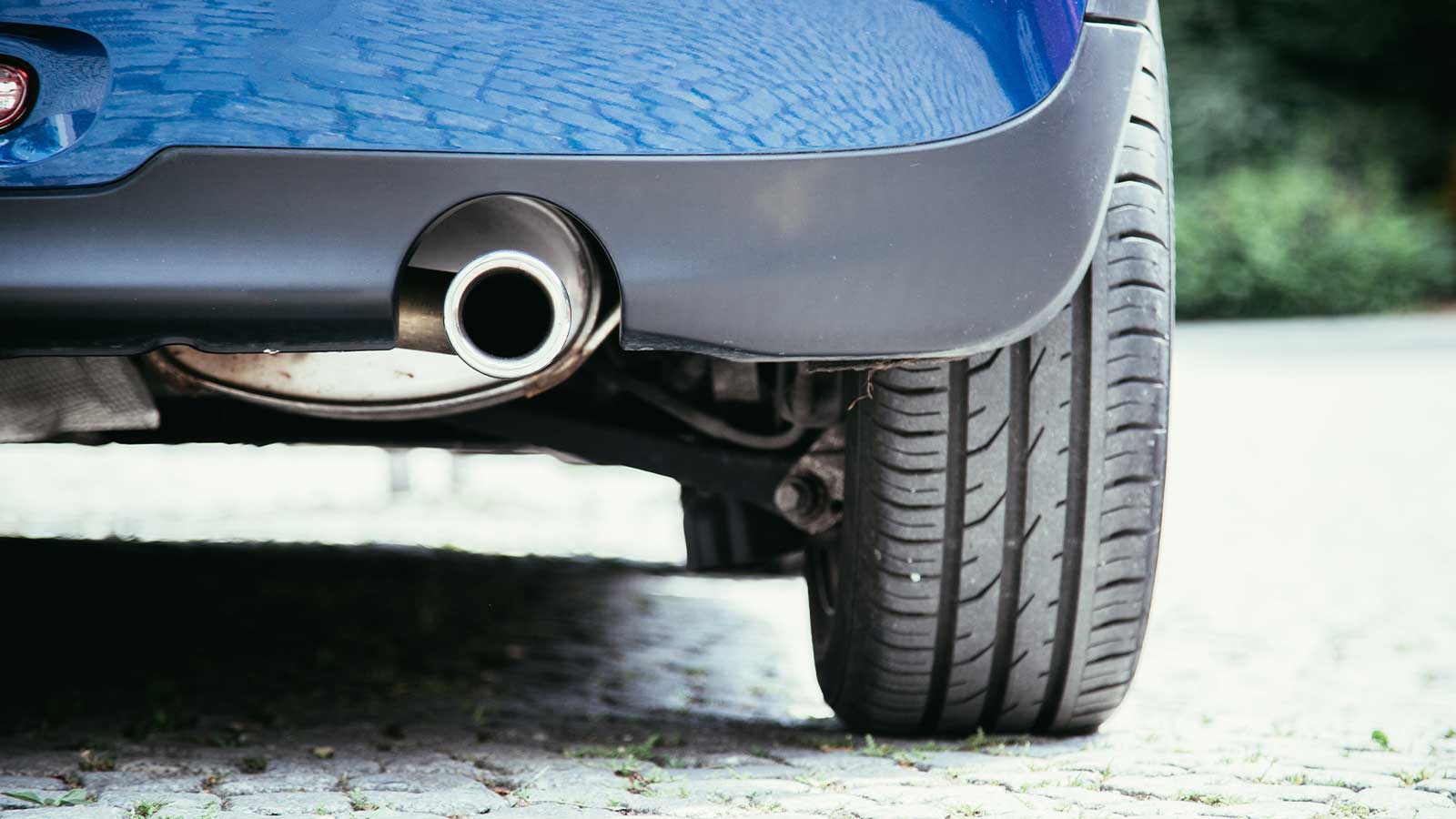
- Leyland
- IVECO
- Daimler
- DAF
- Tesla
- Subaru
- Porsche
- Piaggio
- Peugeot
- Mini
An Investigative Report on Catalytic Converter Crime
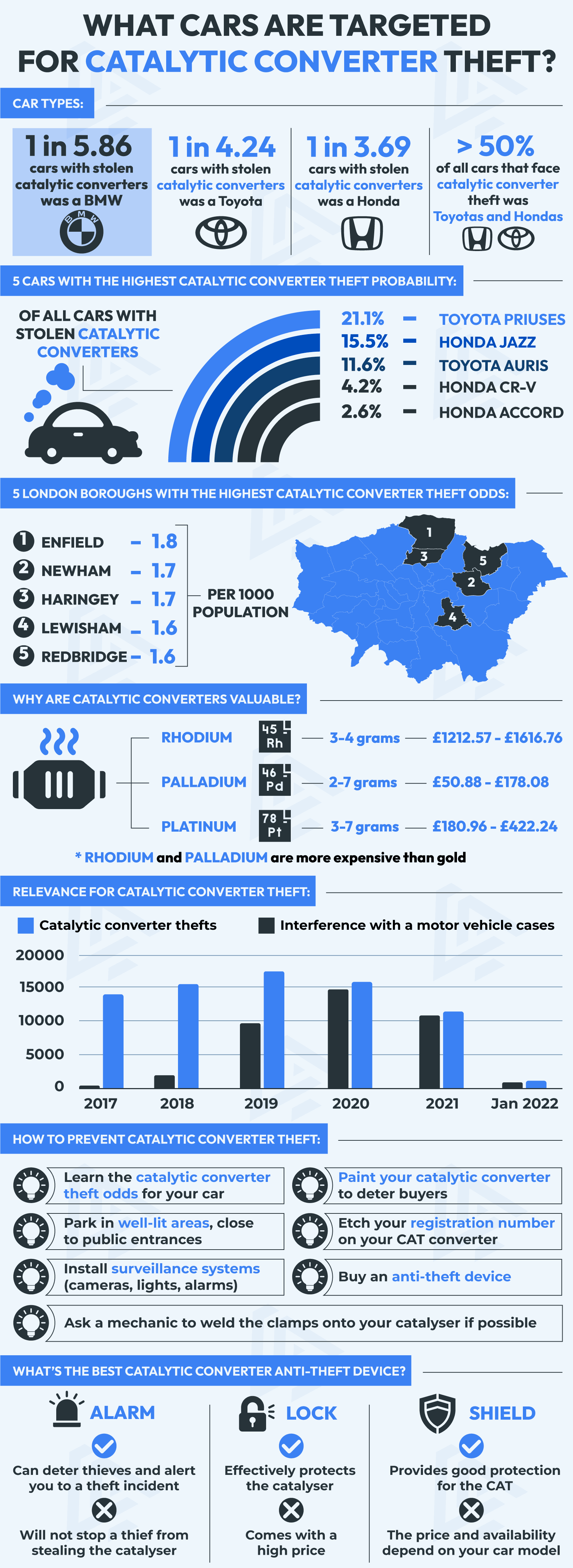
Enter at Your Own Risk: London’s Catalytic Converter Theft Hotspots

London’s Dodgiest Areas to Avoid
Enfield has seen both the most cases and the highest catalytic converter theft probability, with a rate of 1.8 per 1000 population.
Newham is a close second, with a 1.7 per 1000 population, followed by Haringey, which had the same rate, but with almost 100 fewer cases. Lewisham and Redbridge both had 1.6 per 1000 population rates of interferences with vehicles.
Interfering with a vehicle
The rates we present are based on reports filed as “Interfering with a Vehicle” in the database of the Metropolitan Police Service. These can include instances that did not result in a theft of a catalyser or that differ entirely. However, most cases will correspond to CAT thefts.
Catalytic converter theft across time

In the first month of 2022 there were 785 CAT theft reports, lowering the estimated monthly catalytic converter theft odds of previous years.
While the 2022 monthly CAT converter theft rates are the lowest in three years, mainly thanks to a directed effort by UK police, the rates still exceed pre-2019 figures.
Additionally, current reports released by the Metropolitan Police Service only account for one month. Thus, the real car CAT theft odds per month are expected to increase in the future.
Change in interference with vehicle reports
The official figures from the Metropolitan Police Service reflect a 0.3% increase in cases of interfering with a motor vehicle from 2021 to 2022. We can expect car catalyser theft cases to have similarly increased.
At a glance: Change in motor vehicle interference cases
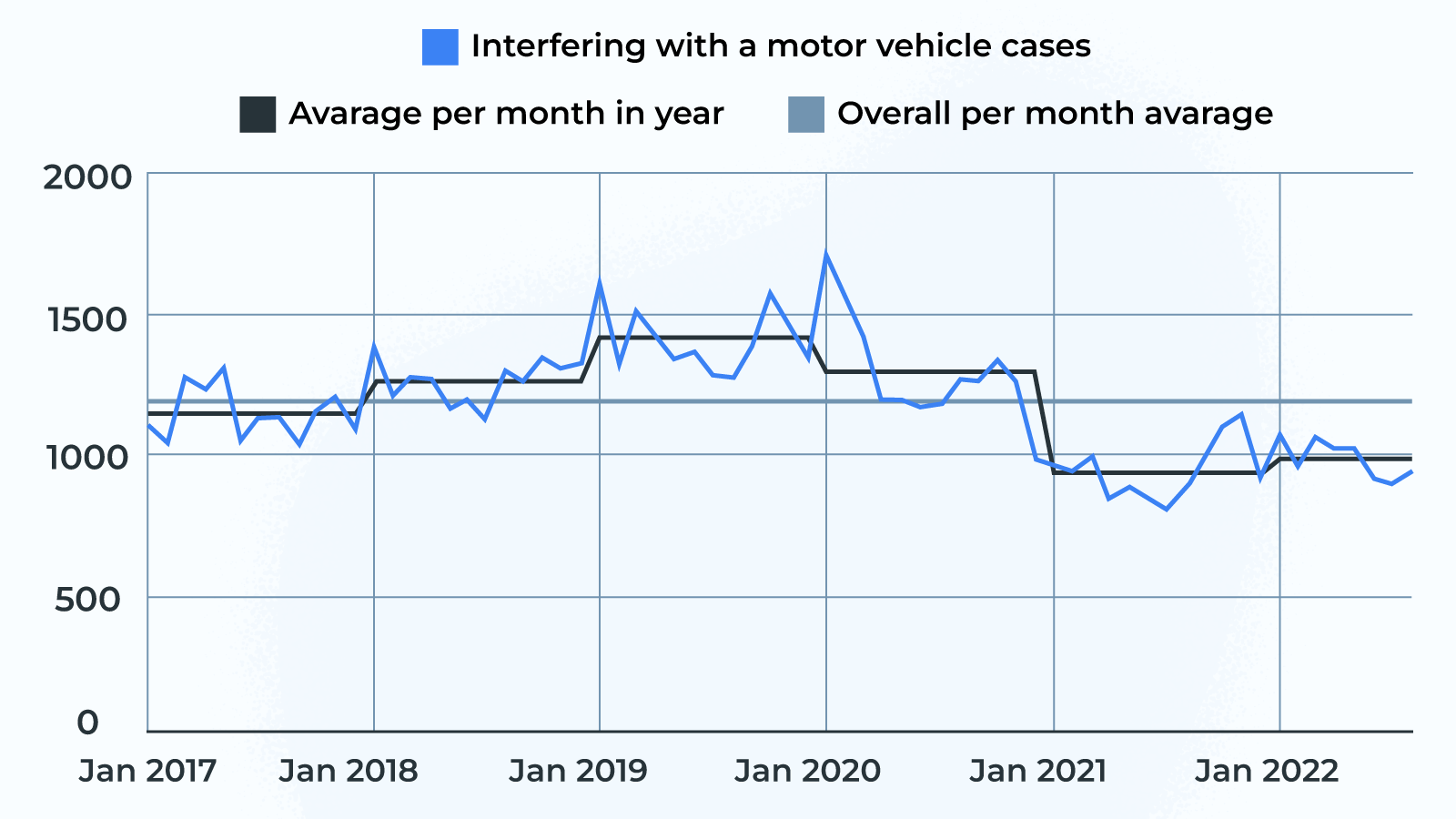
The rates of motor vehicle interference reports have fallen under the 5-year average rate. However, compared to 2021, the first few months of 2022 have seen higher rates of interferences with vehicles, resulting in a slightly higher yearly average.
In other words, 2022 is the first year when interferences with vehicles have not decreased, ever since 2019.
The recent increase in reports is even more aggravating when focusing solely on car catalyser theft rates (as an increasing share of all motor vehicle interferences).
Relevance for catalytic converter theft
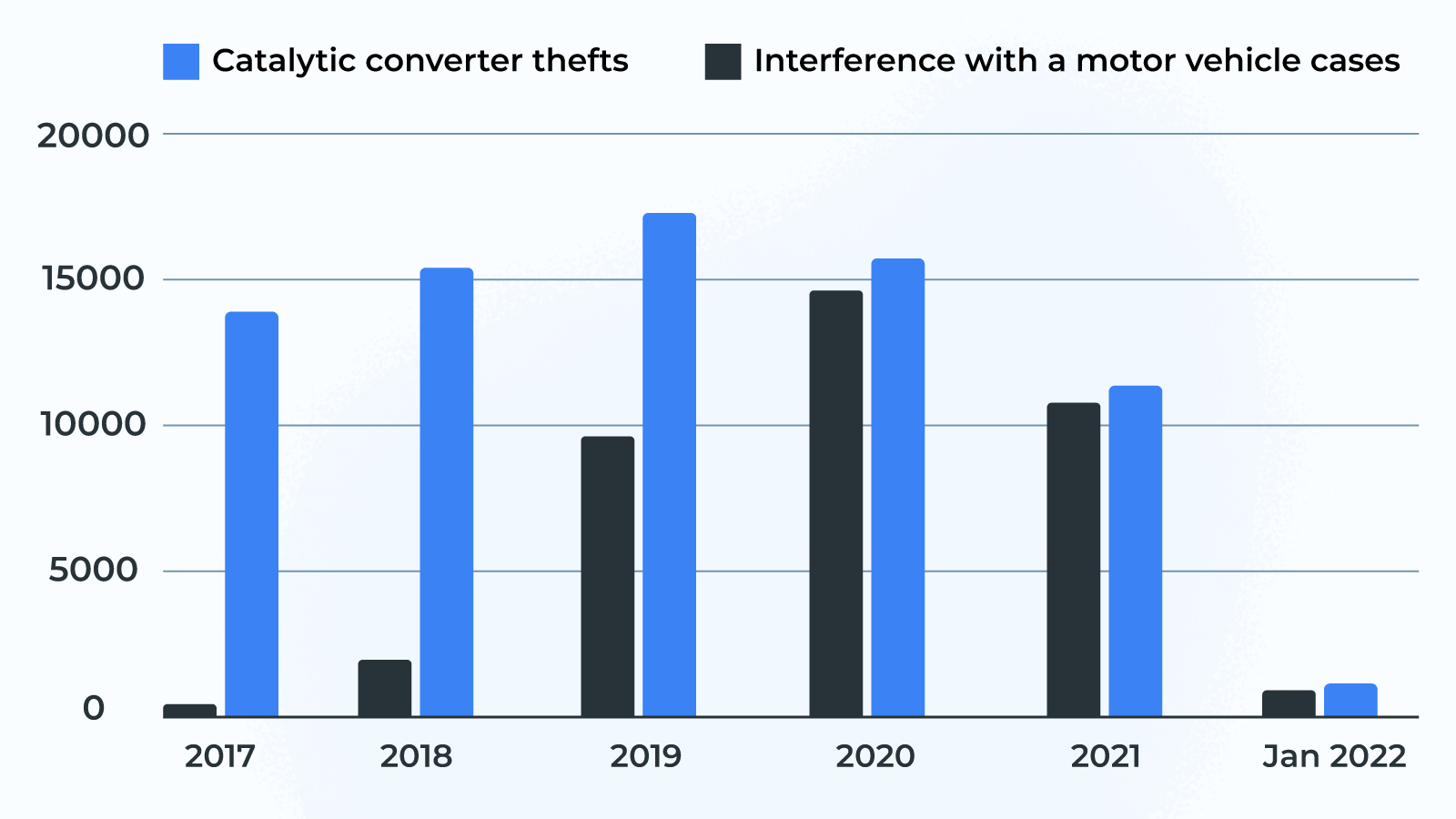
In 2018, reports of stolen catalytic converters made up less than a tenth of all vehicle interferences. By 2019, they were more than half.
Starting with 2020, the rates of vehicle interference and car catalyser theft rates became more and more correlated.
Three conclusions on catalytic converter theft
- The motor vehicle interference reports reflect more and more the rates of car catalyser theft.
- Other instances of vehicle interference reports have decreased, leaving only CAT theft to make the largest share.
- Even if overall tampering with cars has decreased, CAT converter theft stagnated or slightly increased.
Short history of this type of burglary
Just as Lib Dem London Assembly Leader Caroline Pidgeon claims, thefts of catalytic converters were a non-existent problem in 2017 and prior.
The 173 reports of the crime made up one seventy-eighth of the total cases of motor vehicle interference. The fraction of car catalyser theft was non-existent.
The first signs of a growing criminal issue arose back in 2019 when thefts of catalytic converters still made up just over half of all interferences.
However, albeit 2019 was the peak year for car tampering, this was not the case for car catalyser thefts.
Rates of stolen catalysts peaked back in 2020, only falling since. However. Looking across the timeline, the 2022 catalytic converter odds are still worryingly high.
Assembly member Caroline Pidgeon was the first politician to pay attention to the emerging issue. However, car catalyser theft has become a concern for many politicians, as well as an ongoing thorn in the side of the Metropolitan Police Service.
How UK citizens see these odd crimes

The contentious subject of the ongoing CAT converter theft crisis has been discussed if not tackled both in the House of Commons and the House of Lords.
House of Commons
Sir Robert Neill, the conservative constituent representing Bromley and Chislehurst, raised the issue with the Minister of Crime and Policing.
Whether the “honourable Friend” did so effectively is up to debate. He was right to draw attention to the ongoing issue, despite falling rates across the country.
However, it was the vivid and inflammatory imagery of shadow crime gangs of members armed with baseball bats threatening violence for the sake of an extra catalyser that may have skirted the edges of fact and fiction.
In truth, official sources correctly portray catalytic convertor theft as a quick, covert, and mostly non-violent crime.
However, the House of Commons discourse around CAT thefts does draw some correct conclusions: the need to strengthen the 2013 Scrap Metal Dealers Act and the issue’s origin and catalyst being a growing market price of valuable metals.
House of Lords
Since the Conservatives in the House of Commons were so hard on the issue that edged on the inflammatory, we could only double our expectations for the House of Lords.
However, the upper house debate was anything but that.
Lord Berkely of Knighton, House of Lords crossbencher and receiver of the Guinness Prize for Composition, started the discussion around the increasing CAT converter theft rates.
A formidable foe
Conservative Baroness of Barran, was on the other side of this 2019 debate. Her input went mainly along the lines of characterising cat catalyser theft as a real but diminishing issue, apropos the falling rates since, perhaps irrelevantly, 2013, compared to the 2018 figures.
We do not need to benefit from hindsight to not take a Conservative’s word for granted. However, truth be told, recent years have done a great job in falsifying the Baroness’s wishful claim.
Perhaps specific to a noble, Lord Berkley of Knighton’s interest in the crime was “piqued” only following his own instance of being “catalytically bereaved”, i.e., having this CAT converter stolen.
Erring Earl

Earl Attlee also interceded into the riveting debate turned dilettante discussion on security devices on the part of the Baroness. John Riched Attlee contended with his cunning that perhaps the recent increase in the theft of catalysers is a social issue earning him a place in the run for the most obvious statement in the British Parliament.
But, render onto Cesar what is rightfully his, the Earl is not wrong. Where he is completely wrong, however, in his pointing at the prison system and its failure to “reeducate” inmates in finding “legitimate economic” activities.
Perhaps we may be the mad ones, but instead of teaching the disenfranchised economic responsibility, a man of such power and insightfulness could help provide the people of Britain with some decent opportunities to work legitimately.
Earl Attlee was finally sidelined in the discussion, perhaps in a rare instance of friendly fire, coming from the Baroness, aimed at the Earl’s extensive knowledge of the British correctional system.
High metal prices, low police budgets
Lib Dem Lord Paddick then moved the attention towards two issues that fueled the higher catalytic converter theft odds: high precious metal prices and dwindling police budgets.
While agreeing, the Baroness insisted that the higher rates in catalyst theft rates were a success in police recording since overall crime in the disputed areas went down by 73%. Once again, analyses like that for the odds of car theft in the UK show that, albeit Britain is a safer place, car-related crime has surged, with a 7.4% increase within the last year.
Lord Faulkner of Worcester drew attention to the role of the metal theft task force in the (then) new increase in stolen catalytic converters.
While the force managed to curve past surges in theft rates for CAT converters since its introduction by the 2013 Scrap Metal Dealers Act, it was soon “abandoned” despite its effectiveness.
Britain could benefit from a stronger metal theft task force even today, and there are signs that authorities are engaging in a new campaign against the theft of catalytic converters.
In some sense, authorities have already taken the steps to alleviate the issue, with the British Transport Police coordinating a multi-agency operation to reduce catalytic converter theft already in 2021.
Catalytic converter price UK
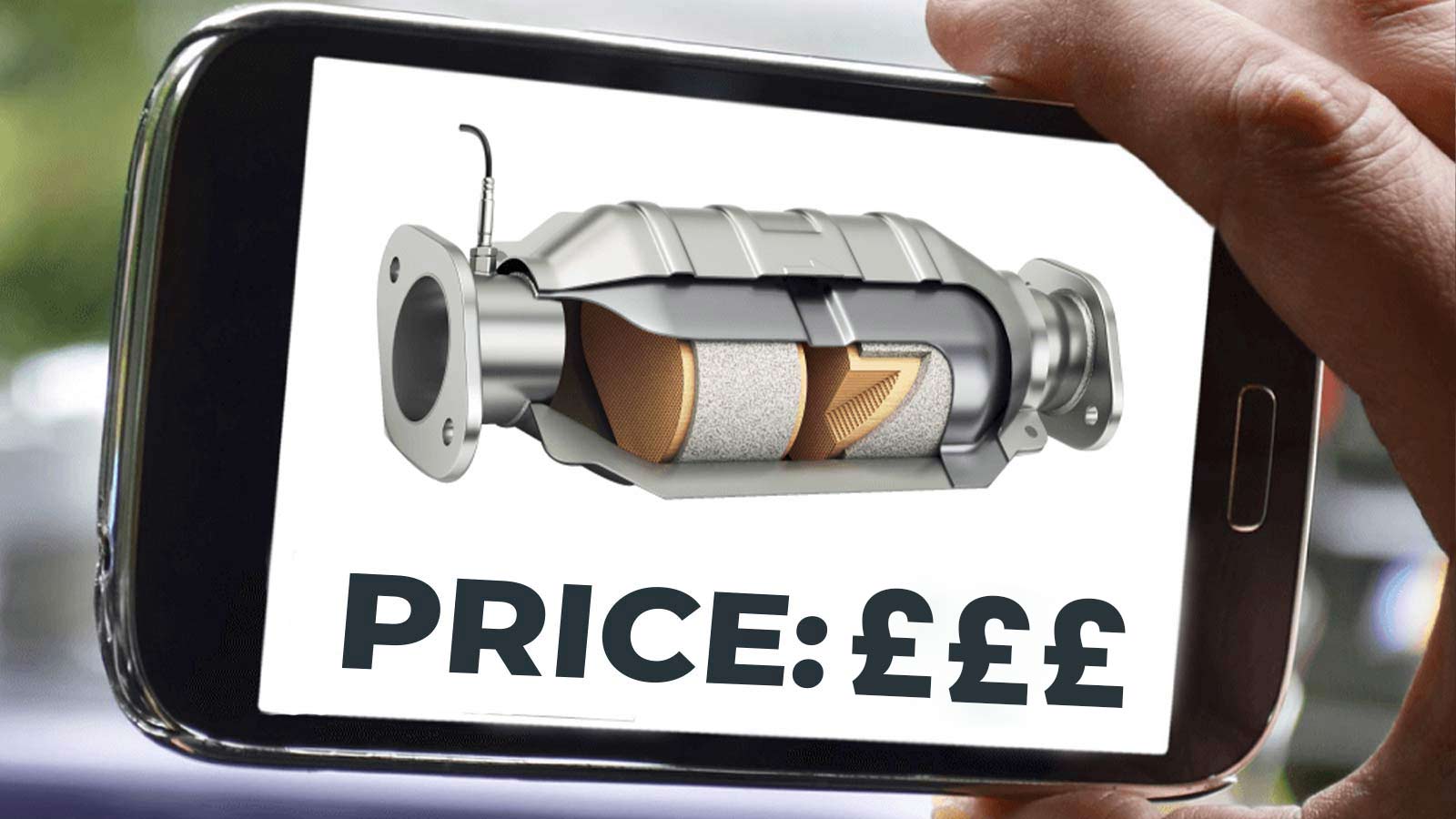
Catalysts are expensive car parts. The loss of one can come with a repair bill in the thousands.
How much it costs you to replace the catalytic converter?
A new catalyst will cost you between £180 and £360, depending on your car and current stock. Unfortunately, its installation is much costlier.
The overall price for such an event can reach £2,000 for most car owners that fell victim to the theft of catalytic converters.
The catalytic converter price for thieves
A cat converter can sell for hundreds of pounds in cash on the black market, even as scrap.
The key fact about catalysts is that they are valuable both as car parts and scrap metal. Nevertheless, considering the £2,000 bill accompanying the replacement of one, thieves hardly make a profit.
Why are catalytic converters valuable?
Catalysts contain high amounts of palladium and rhodium, both metals that are more expensive than gold. They also contain platinum, another precious metal.
Current prices for precious metals present in catalysts
- Palladium – £1,853.27 / oz
- Rhodium – £12,503.23 / oz
- Platinum – £789.62 / oz
Payouts on Wheels: Models With the Most Valuable Catalytic Converters

Most recent reports point towards the Ferrari F430, which has a CAT with a price tag of over £3,273.
In general, exotic catalysers, i.e., those fitted for foreign cars, can go up to £970, while torpedo CATs have an upper price bound of £1,085.
Aftermarket versions can sell for as low as £18. Still, the foil catalysts are the cheapest, with some selling for as low as £6.
The unlucky 13: Top cars for catalytic converter theft
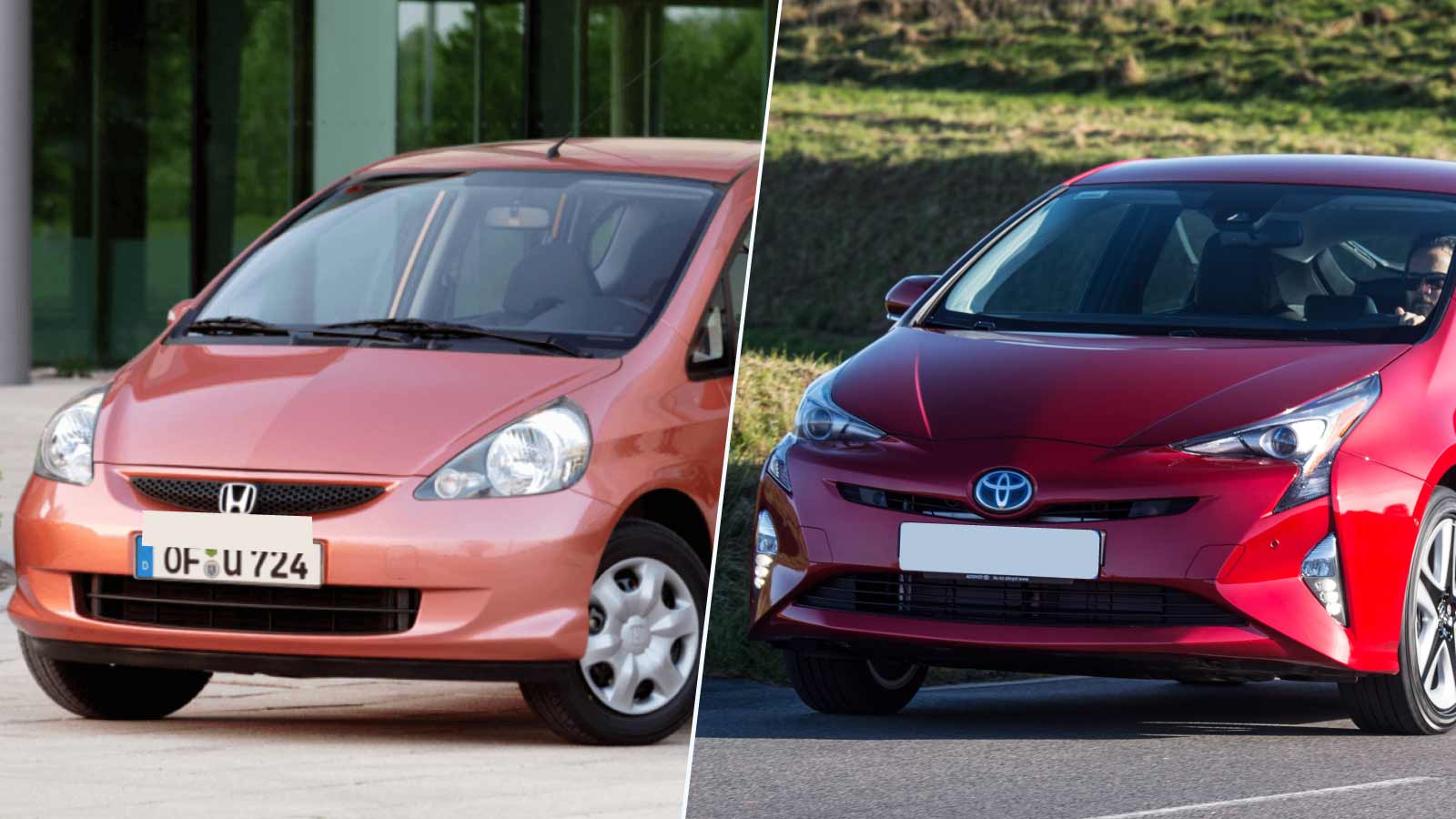
| Car models | Cases since 2018 | Cases in January 2022 |
|---|---|---|
| Toyota Prius | 7408 | 58 |
| Honda Jazz | 5448 | 54 |
| Toyota Auris | 4050 | 53 |
| Honda CR-V | 1468 | 28 |
| Honda Civic | 1109 | 24 |
| Honda Accord | 927 | 11 |
| Lexus CT 200H | 535 | 16 |
| Lexus Rx 400 | 622 | 2 |
| Toyota Yaris | 431 | 5 |
| Lexus Rx 400H | 277 | 2 |
| Volkswagen Polo | 271 | 1 |
| Volkswagen Golf | 263 | 8 |
| Lexus CT 200 | 252 | 11 |
Honda and Toyota models, in general, have been the most targeted models for having their catalytic converters stolen.
Honda Jazz models faced 808 thefts in 2021 and 54 in January 2022, with Toyota Prius models having their CAT stolen 801 times in 2021 and 58 times in January. These two models are the leading ones in the top cars for catalytic converter theft.
Share of the first 13 top cars for catalytic theft
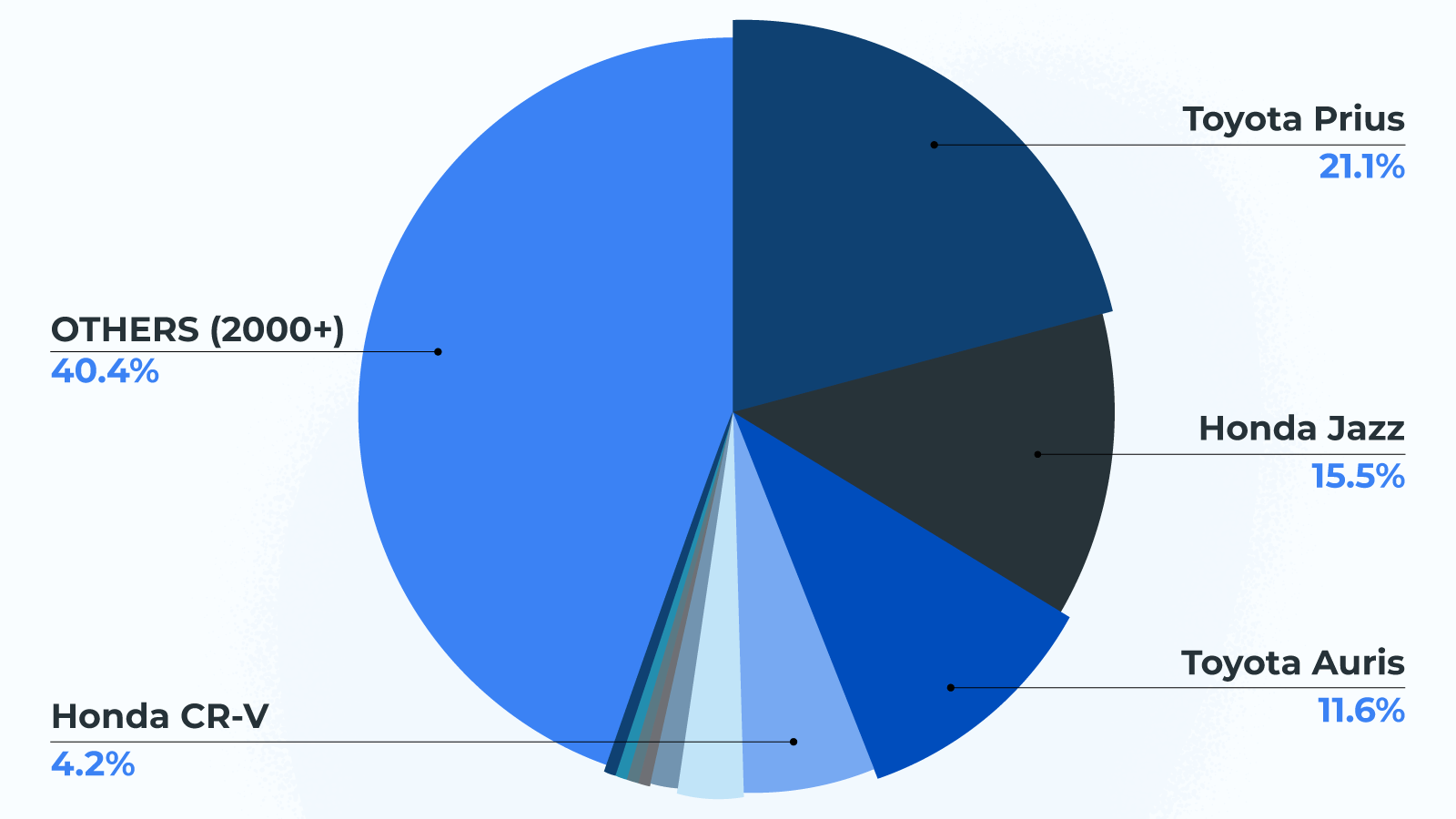
What is a catalytic converter?
Catalysers are exhaust emission control devices that turn pollutant fumes into less harmful ones using a catalyst.
As their denomination would imply, catalytic converters are placed along the exhaust pipe. All fumes generated by the car’s combustion process go through the catalyser. By way of a redox reaction, the catalytic agents reduce the level of pollution of the exiting fumes.
The first use of catalysers
The first widespread use of catalysers occurred in the United States, as per the US Environmental Protection Agency’s regulations. Since 1975 on, most gasoline-powered vehicles have been equipped with catalysers.
What does a catalytic converter look like?
Catalysers often resemble a tubular chamber placed along the exhaust pipe. You can most often recognise it as a bump or bulge on the exhaust pipe.
Some CAT converters will have two functional parts, along with an extra parallel valve. The first part is a cold start catalyst, while the other subsequent one is a standard three-way catalyst.
How to prevent catalytic converter theft
- Park in well-lit areas or close to public entrances
- Install surveillance systems around your parking area (motion-sensitive lights, cameras, etc.)
- Paint your CAT converter to deter subsequent buyers
- Etch your license plate number or your VIN onto the CAT converter
- Learn if your car is a possible target. Hybrids, SUVs or trucks can be at higher risk
- Ask a mechanic to weld the exhaust clamps onto your CAT converter if possible.
- Buy an anti-theft device
What is the best catalytic converter anti-theft device?
A universal CAT alarm is an accessible and effective option. The system has its faults, and it will mainly alarm you, not protect your catalyser.
A CAT converter lock is a more direct protection device. Systems like the CatClamp MAXX provide a cage-like contraption that will foil any criminal’s attempt to take your CAT. However, locks are considerably more expensive
Some popular models that are prone to the theft of their catalytic converters can be fitted with a catalyser shield, which is a cheap and easy-to-use anti-theft addition.
Catalytic converter theft prevention devices compared
| Devices | Pros | Cons |
|---|---|---|
| Alarm | Can deter thieves and alert you to a theft incident | Will not stop a thief from stealing the catalyser |
| Lock | Effectively protects the catalyser | Comes with a high price |
| Shield | Provides good protection for the CAT | The price and availability depends on your car model |
Methodology
Our statistical analysts perform all calculations using data provided by official and trustable sources.
The content we publish is a result of extensive research using resources publicly provided by police agencies in the UK. Its aim is to inform the reader and open the space for a constructive discussion around current issues.
Our experts have approached contentious subjects, such as the chances of knife crime in London. Thus, we find it essential to provide an objective and balanced outlook, as well as back any statement with supporting evidence.
You can find all resources we have used as well as extensive explanations for the process behind the published catalytic converter theft odds.
Our data, albeit data-backed and informative, should only be consulted in conjunction with trusted sources and the guidance of official expert organisations.
At no point does our content aim to be prescriptive or inflammatory regarding an ongoing issue. We consider our published article to be our only substantive way of aiding the resolution and betterment of Great Britain.















